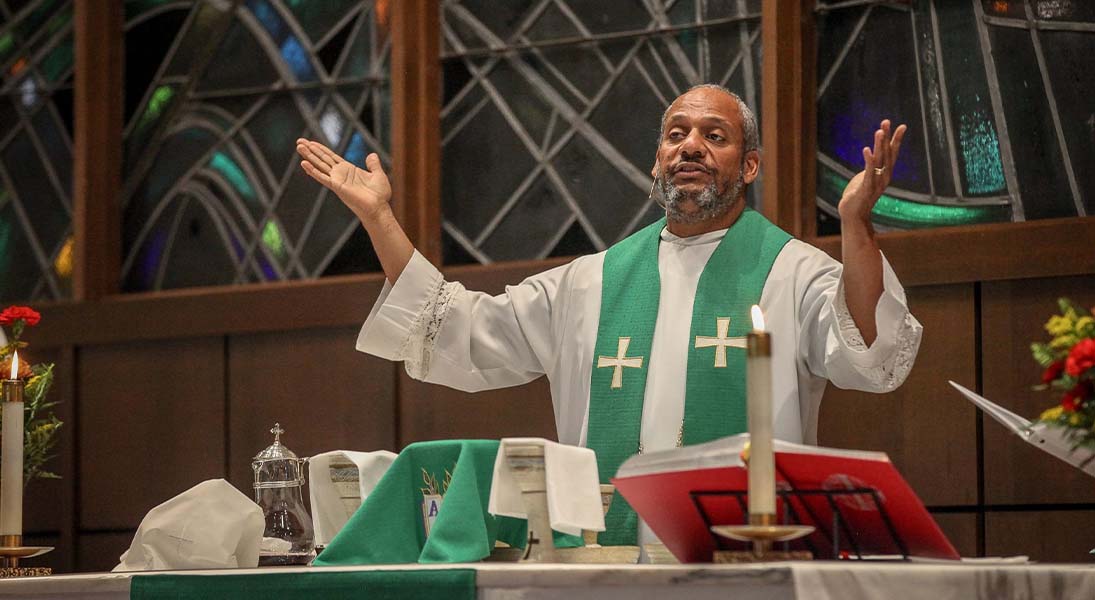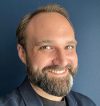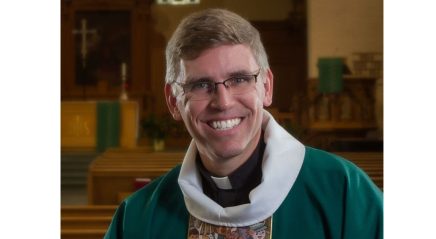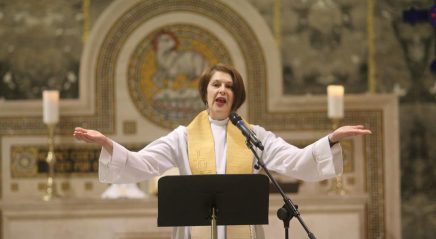Timothy Graham didn’t plan on becoming a bishop. “I knew my name would be lifted up, but I didn’t have any expectations,” said Graham, who serves as a pastor of Messiah Lutheran Church in Fort Wayne, Ind.
Although he knew he was under consideration for bishop of the Indiana-Kentucky Synod, Graham didn’t fill out his biographical information for this year’s assembly ahead of time. “Well, if the Holy Spirit wants it to happen, [it will],” he thought. “I could not have planned it.”
When Graham found himself on the ballot for bishop, he shared his life passage with the assembly: 1 Timothy 12-17, which centers on Paul’s transformation, made possible through God’s grace. “I said I could think of a million reasons why I shouldn’t be bishop—that’s the way I started [my remarks],” he said. “I meant it wholeheartedly.”
But Graham also shared some of his accomplishments and experiences in ministry, including bringing the financially struggling congregation of Messiah to stability, partially through alternative revenue methods. He successfully completed a $2.3 million building renovation there without debt, and now serves alongside nine staff members.
“It wasn’t my plan to be standing up there,” he said of the assembly election process. “The overwhelming response I’ve heard from people was that I was just down-to-earth, and they didn’t feel like I was pushing to be there in that moment.”
For the last three years, Graham has served on the synod council, to which he was reelected—as well as elected to its executive team—on June 6. On June 8 he was elected the synod’s bishop. (“A trifecta,” he said.)
“It was a surprising journey.”
Deep roots in the church
Graham was adopted as a child while his adoptive father was enrolled at Wartburg Theological Seminary in Dubuque, Iowa. “So I’ve been part of the Lutheran church my whole life,” he said. When his father became a pastor, Graham went with him on ministry visits and to assemblies and other church events. “I certainly had a familiarity with how the church functioned at a broader level,” he said.
Graham’s father ran a ministerial alliance of ecumenical congregations in Fort Wayne, growing the group from 80 congregations to 150. “What I saw was how he worked with leaders from other places, and that was very important to him,” he said. “In part, what the ELCA is about is that, aside from the differences we may have, we’re bridge builders. So I think l learned some of that from my dad, just witnessing his work and watching the things he did.”
About eight years ago, Graham’s father died. “When I was elected, my initial thought was, ‘I wish he could have been here,’” he said. “It was a whole range of emotions.”
“Maybe there are some things I can share that I’ve learned along the way to help them renegotiate their path or find new ways to thrive.”
Graham’s first call was as redevelopment pastor of Light of the Cross Lutheran Worship Center in Fort Wayne, where his father had also served. “I knew the ladies,” he said of the congregants. “They remembered me as a little boy.”
Light of the Cross would ultimately close two and a half years later. “That was brutal for me,” Graham said. “Closing that ministry was a hard reality for me.”
It’s a reality the synod is regularly confronted with. “Indiana-Kentucky is mostly a rural synod,” he said. “You have some larger cities, but the majority of congregations are rural, smaller congregations. Like many of the other synods, and probably like many other denominations, the rural areas and smaller congregations have really struggled.”
Graham sees meeting the needs of those congregations as a top priority for his ministry as bishop. He expects to be “navigating the realities of some decline in the church, some challenges that smaller churches have, and making sure that we can help them to thrive the best that they can in their communities,” he said. “Maybe there are some things I can share with them that I’ve learned along the way to help them renegotiate their path or find new ways to thrive.”
Servant leadership
Graham identifies two aspects of his life that are critically important to his leadership and to his ministry: family and recovery.
“Dad, you should be a pastor!” It was a sentiment Graham’s daughter shared with him at the dinner table when she was 6 years old. At the time, he appreciated her encouragement but hadn’t yet seriously begun to consider ministry. That path began through his participation in Alcoholics Anonymous.
“I’m a recovering alcoholic, so that’s a big thing for me,” he said. “I’ve been sober 24 years, but in the last couple years I’ve been going to more meetings and helping more people there. That’s been a big gift that gives me life outside of the church. I really enjoy being part of that community, because I’m not ‘Pastor,’ I’m not ‘Bishop,’ in that meeting. I’m just Tim, an alcoholic. And then it’s an opportunity for me to help people in another way.”
There’s a line in the “Big Book” of Alcoholics Anonymous that is read in the program: “Our very lives, as ex-problem drinkers, depend upon our constant thought of others and how we may help meet their needs.” It resonated deeply for Graham. “Interestingly, that was the reason I went to seminary,” he said. “When I read that, it made me think that my life could be used in a greater way to serve other people.”
After following in his father’s footsteps by also attending Wartburg, Graham began pastoral ministry. When Light of the Cross closed, he began a call as an associate pastor of Messiah. Four years later, he became senior pastor. “Servant leadership is a big part of how I approach ministry,” he said. “Even to my staff, I’m there to serve them and to help them thrive, as opposed to the other way. I think it’s mutual.”
Although it will be an adjustment for Graham and his wife to move from Fort Wayne—where their four adult kids and seven grandkids also live—to Indianapolis, he is eager to begin serving in his new role, which he will do when he takes office Sept. 1.
“I don’t have all the answers by any means, but I’ve had a broad range of experiences, from closing a congregation to helping one reestablish itself,” he said. “I think that will lend itself well to serving as bishop.”










